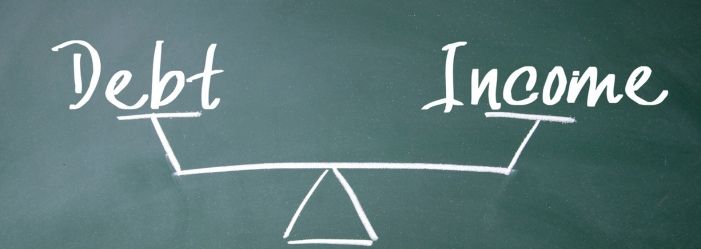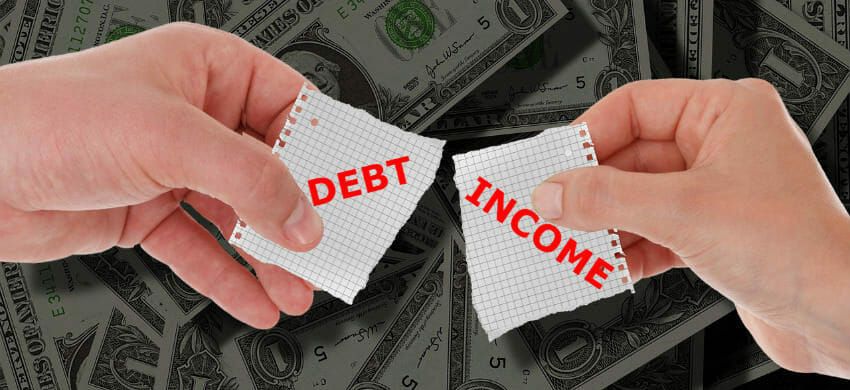Last Updated: March 29, 2024
Lower Your Debt-to-Income Ratio

Disclaimer: We are not qualified legal or tax professionals and are not giving advice. Always speak with a qualified professional before making any legal or financial decisions.
Understanding your debt-to-income ratio (DTI) is crucial in managing your financial health and planning for the future. This key metric not only influences your ability to secure loans but also reflects your overall financial stability.
Whether you're applying for a mortgage, auto loan, or assessing your financial health, knowing your DTI can empower you to make informed decisions.
Today, we'll break down what the debt-to-income ratio means, how to calculate it effortlessly, and the steps you can take to improve your financial standing. By clarifying this concept, we aim to provide you with the tools to navigate your financial journey with confidence.
If you're ready to talk now, skip the article and click here for a free consultation with our debt specialist.
What is the Debt to debt-to-income ratio?
The debt-to-income ratio looks at how much you owe versus how much you earn. It is calculated by taking the monthly payment total of all your debts divided by your monthly gross income. That number is then multiplied by 100 to give you a percentage.
How to calculate debt to income ratio:
- Add up all your monthly debt payments (car loans, credit card minimum payments, etc).
- Calculate your gross monthly income (that is what you make before taxes)
- Divide the debt by the income
- debt/income (a number less than 1)
- If the number is greater than 1, either you did the math wrong or you have more debt than you have income
- Multiply that number by 100
For instance: you have $1000 in monthly debt payments and $4000 in monthly income. The ratio is 0.25 or 25%. If you prefer to use a debt-to-income ratio calculator, there are several available online.
Lenders consider a good debt-to-income ratio to be less than 43%. The higher your debt-to-income ratio, the lower the probability that you will be able to repay a new loan.
Mortgage to Income Ratio
Mortgages generally have more stringent criteria than cars or other types of loans. Depending on the lender, you may be able to have a slightly higher than 43% debt-to-income ratio to get a qualifying mortgage. A qualified mortgage protects you from interest-only loans, increasing loan principal (negative amortization), balloon payments, and excessive upfront points and fees.
If you have a debt-to-income ratio that is higher than preferred, shop around for a lender who may be able to help. Studies show that people who look at three or more different mortgage companies receive better rates and terms.
Mortgage lenders prefer that your mortgage payments are no more than 28% of your gross monthly income. This is your mortgage-to-income ratio. This is calculated in the same way as debt to income ratio but with total monthly mortgage payments instead of debt payments.
Is Debt to Income Ratio the Same as Debt to Equity?
Debt-to-equity ratios are similar to debt-to-income ratios. Equity debt is used by companies to evaluate the health of the company and whether it can take out loans to cover business expansion, new equipment or buildings, etc.
Common Debt-to-Income Ratio Guidelines
When evaluating your debt-to-income ratio, lenders look at guidelines based on the type of loan you are seeking. Having awareness of these standards can help you determine if your current ratio puts your loan approval at risk.
Mortgages
For a mortgage, lenders ideally like to see your debt-to-income ratio at 28% or less. This means your total monthly debt payments, including your new mortgage, should not exceed 28% of your gross monthly income.
Exceeding this guideline can make it more difficult to get approved for home financing. However, some lenders may be willing to go up to 36% for qualified borrowers with excellent credit.
Auto Loans
Auto lending guidelines are more flexible than mortgages, but a debt-to-income ratio still factors in. Most auto lenders prefer your ratio to stay under 15% when calculating just your auto loan payment against your income.
On a $20,000 5-year loan at 6% interest, a monthly payment would be around $380. To meet the standard 15% ratio on this, your gross monthly income should be at least $2,530.
Personal Loans
Approval for personal loans is primarily based on credit scores and history. However, income and existing debts still matter. A good target is keeping your debt-to-income ratio at or below 36% when factoring in a new personal loan.
If your ratio exceeds this, it doesn’t necessarily preclude you from getting approved. However. interest rates and qualification amounts may not be as favorable compared to borrowers with lower ratios.
FAQs
How Pacific Debt Can Help
If your debt-to-income ratio is out of control and you are having trouble making monthly payments, Pacific Debt, Inc. may be able to help you.
Pacific Debt, Inc. is one of the leading debt settlement companies in the US. We work directly with your creditors on your behalf to reduce your debt, often for substantially less than you owe. Your initial phone call is 100% free, and our debt experts will explain your options, so you fully understand them.
Pacific Debt, Inc.
If you’d like more information on debt settlement or have more than $10,000 in credit card debt that you can’t pay, contact Pacific Debt, Inc. We may be able to help you become debt-free in 2 to 4 years. We have settled over $250 million in debt for our customers since 2002. Pacific Debt, Inc. is accredited with the Consumer Debt Relief Initiative (CDRI) and is an A+ member of the Better Business Bureau. We rate very highly in Top Consumer Reviews, Top Ten Reviews, Consumers Advocate, Consumer Affairs, Trust Pilot, and US News and World Report.
Alabama, Alaska, Arizona, Arkansas, California, Colorado, District of Columbia, Florida, Idaho, Indiana, Kentucky, Louisiana, Massachusetts, Maryland, Michigan, Minnesota, Missouri, Mississippi, Montana, North Carolina, Nebraska, New Mexico, New York, Oklahoma, Pennsylvania, South Dakota, Texas, Utah, Virginia, Wisconsin
* Other states can be connected to one of our trusted partners
*Disclaimer: Pacific Debt Relief explicitly states that it is not a credit repair organization, and its program does not aim to improve individuals' credit scores. The information provided here is intended solely for educational purposes, aiding consumers in making informed decisions regarding credit and debt matters. The content does not constitute legal or financial advice. Pacific Debt Relief strongly advises individuals to seek the counsel of qualified professionals before undertaking any legal or financial actions.
Reduce Your Credit Card Debt By Up to Half

BBB Reviews | 4.9/5.0 Rating









 Do Not Sell My Personal Information
Do Not Sell My Personal Information